
Photograph: APChanel / Shutterstock.com
Letter from the Editors
Happy Chinese New Year from China Labour Bulletin!
CLB analysed labour data collected in 2023, which shows that the post-pandemic economy has been disastrous for the manufacturing and construction industries and the workers. Companies across sectors are adapting to the changing economy in different ways, affecting workers legal rights and employment opportunities. Workers have resorted to collective action and flocked to the service industry, but changing consumer habits are making this refuge equally precarious.
In this environment, foreign and local corporations, together with local and enterprise unions must pay their due diligence to the working conditions in their supplier companies and apply disengagement strategies responsibly, which CLB has worked to ensure.
In a side session to 2024 OECD forum, SOMO and CLB will present our findings and discuss how robust due diligence can enhance protection for the rights of Chinese workers in international supply chains. Register here for this Friday night!
CLB sincerely wishes the economic changes could empower Chinese workers and lead to a just transition that workers participate in and benefit from.
Thanks for reading!
CLB Editors
Workers’ Voices
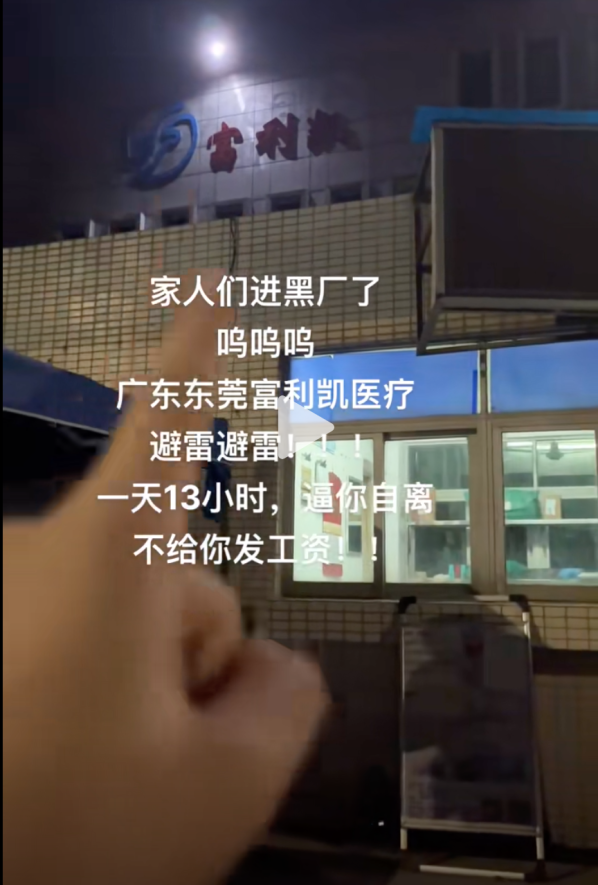
In a video that has received over 2,000 comments, a student worker points her finger at the Flexicare Dongguan factory and warns other workers to avoid it. Source: Douyin
The contract states that we have to finish the contracted term, but it doesn’t say that we can’t resign!
China Labour Bulletin recently recorded a case in our Workers’ Calls-for-help Map in which student workers’ rights were violated at their temporary factory employment in Flexicare Medical (Dongguan) Ltd. (富利凯医疗用品(东莞)有限公司). Student workers speak out over excessive overtime, bureaucratic policies forcing workers’ to resign (as opposed to firing and compensating them), and wages withheld to coerce them into working.
In a video posted to Douyin on 12 January, a student worker pointed her finger at the factory gate and calls out the company for excessive overtime work (of 13 hours/day) and violating her labour contract by withholding wages to try to coerce her to finish her contract, warning others to avoid this factory. The student complained:
The HR department won't approve our resignation unless we complete the entire contract period. However, the contract states that we should get paid after working 70 hours. But [we worked and] now, we haven't received any money. It’s outrageous!
CLB called the local Human Resources and Social Security bureau of Hengli township in Dongguan on 15 January. The officer confirmed the existence of this complaint and told us that the bureau is investigating. On the same day, CLB called the local branch of China’s official trade union in Hengli township. The union official confirmed that Flexicare has an enterprise trade but refused to discuss this case.
Flexicare UK is “one of the leading suppliers of anaesthesia and respiratory consumables,” and it supplies the UK’s National Health Service (NHS). Flexicare’s website states that it “is committed to ethical procurement.” Flexicare UK has a duty to ensure its operations follow international and UK laws, and that its subsidiary follows China’s labour laws.
Worker Representation
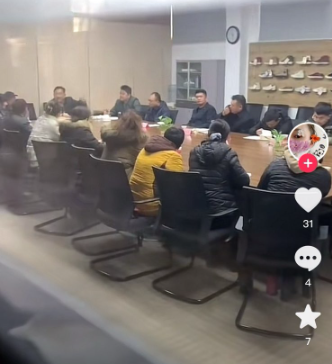
Baoyi workers attend a negotiation about their compensation plan. Source: CLB Strike Map (Douyin)
Over 1,000 workers at the Yangzhou Baoyi Shoe Factory (扬州宝亿制鞋有限公司) in Jiangsu province went on strike from 29 November to 7 December 2023 to demand a concrete calculation of the economic compensation owed to them guaranteed by law upon the factory’s shutdown.
The Baoyi shoe factory issued a notice on 29 November 2023, stating that the factory would close on 31 December and that employment contracts would also terminate that day. The notice specified that the precise basis for economic compensation would be revealed after 20 December. Dissatisfied with this uncertainty, workers went on strike.
Based on factory notices and workers’ online posts, China Labour Bulletin found that the Baoyi factory violated several provisions of China’s labour laws, including non-payment of social security and provident housing fund.
China Labour Bulletin made a call on 8 December to the Human Resources and Social Security Bureau overseeing the Yangzhou Economic and Technological Development Zone, where the Baoyi factory is located. The Social Security Bureau staff told us that unpaid social security at Baoyi is “a historical problem” and that, although the authorities know about the violation, “there are always reasonable and legitimate reasons” for not enforcing the law on this matter.
Moreover, CLB found the enterprise union was absent during the strike, and the local branches of China’s official trade union said they were not aware of the strike. One union even denied that the strike occurred at all. In a video posted on 27 December, workers are seen leaving the premises for good.
Baoyi is owned by Taiwan's Pou Chen Corporation and produces athletic shoes for Converse, a division of Nike. Nike and Pou Chen should follow up to ensure unemployed Baoyi workers are in fact paid their legal economic compensation, social security, and housing provident funds according to the Labour Contract Law. Further, suppliers and brands should have responsible disengagement strategies, particularly as global supply chains are undergoing widespread change these past several years in Asia.
Strike Action
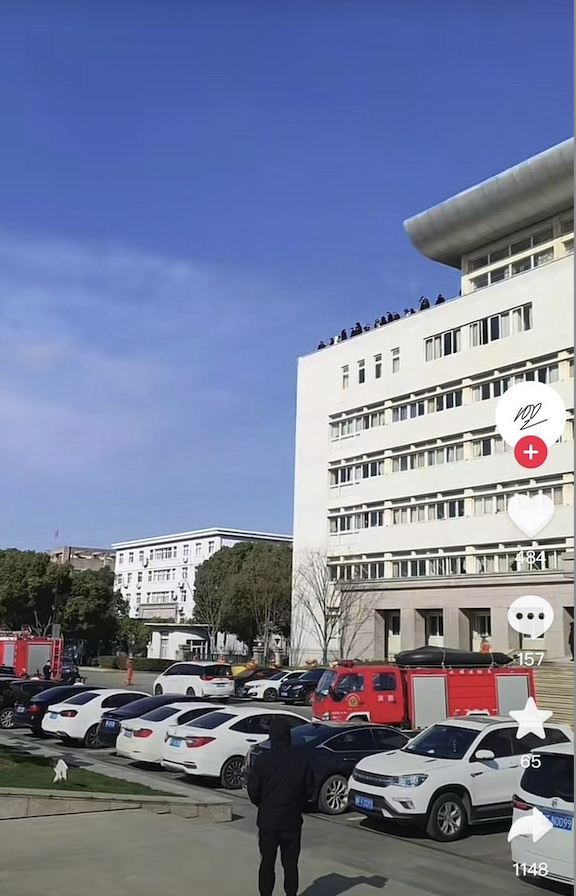
Garment workers protesting on the rooftop of the government building in Puyuan, Zhejiang
Construction protests still prevalent while factory strikes increased. CLB’s Strike Map collected 175 workers strikes and protests in January 2024, a slight increase from 162 in December. Protests by construction workers remained the highest, accounting for 88 cases, as anticipated with the Lunar New Year approaching and workers seeking to get back their unpaid wages for the year. The number of protests among workers in manufacturing rose from 38 to 50 cases in January, especially in the garment industry which recorded 15 cases.
Factory workers and bosses owed fees after store bankruptcy in Zhejiang. The bankruptcy of a clothing store in Puyuan, Zhejiang on 23 January left over a hundred small factories and workers without payment. Videos show dozens of workers demanding payment at the town government hall, with some protesting on the rooftop. Meanwhile, two factory bosses who supply the clothing store threatened to jump off the building. Police tried to negotiate with workers despite the fact that the owner of the clothing store could not be found. Since November, CLB has documented numerous protests in the garment industry. Zhejiang had the most protests with 12 cases, followed by Guangdong (9 cases) and Fujian (4 cases).
Workers displayed banners after the hospital defaulted on debts. Workers at the Southestern Lu Hospital (鲁西南医院) in Liaocheng, Shandong, held banners urging for a chance to restructure the hospital’s debts on 31 January. Online reports suggest that the private hospital defaulted on its debts. With depleted medical materials, it was unable to treat patients, while the staff had not been paid for 8 months. The hospital's director announced a ten-day hunger strike to alleviate his guilt towards the unpaid employees. The workers' collective action, however, is believed to target creditors, rather than demanding wages from management. Debt issues arising from the rapid expansion of private hospitals can result in unpaid wages and conflicts between medical staff and patients. Please stay tuned for our upcoming report on workers' protests in the medical industry for more information.
2023 year in review for workers’ rights
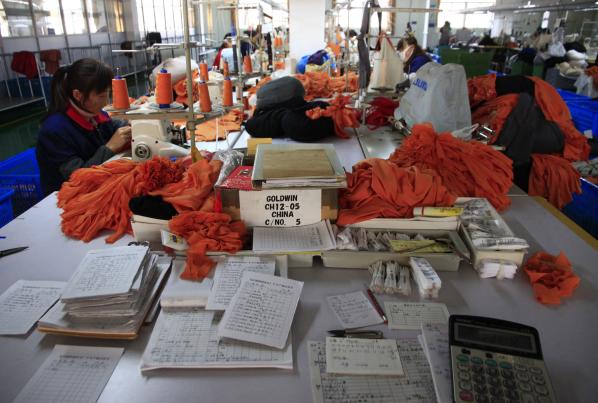
Photograph: humphery / Shutterstock.com
China Labour Bulletin operates a labour rights database that includes our well-known Strike Map. In 2023, the Strike Map collected 1,794 incidents of workers striking and protesting across China, reaching pre-pandemic levels of worker collective action.
CLB's researchers analysed the Strike Map data, industry by industry, to bring a report on the state of workers' rights in China in 2023.
- In the manufacturing sector, garment and electronics factories shut down or relocated while renewable energy vehicle companies competed for the market
- In the construction industry, wage arrears were widespread after overproduction and stalled projects
- In transport and logistics, platform workers fought back against price-cutting policies implemented to gain market share
- In the services sector, traditional retailers laid off workers, and platform companies gained new market share over hypermarkets
- In the public sector, sanitation, medical and education workers went unpaid as local governments are tight on funds
In conclusion, workers need representation and new tools in the face of widespread rights violations in China.
Read in full here.
CLB in the News
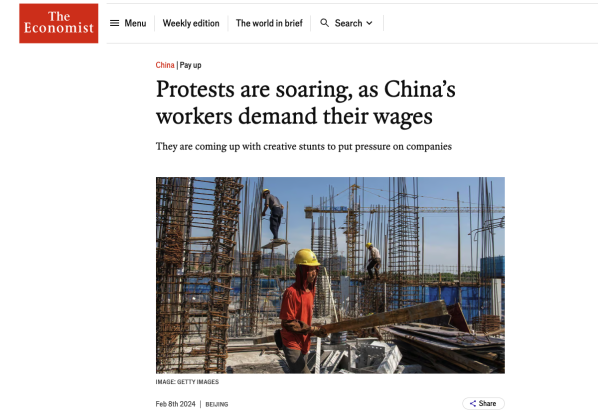
CLB’s Strike Map was quoted in the Economists on protests before the Spring Festival
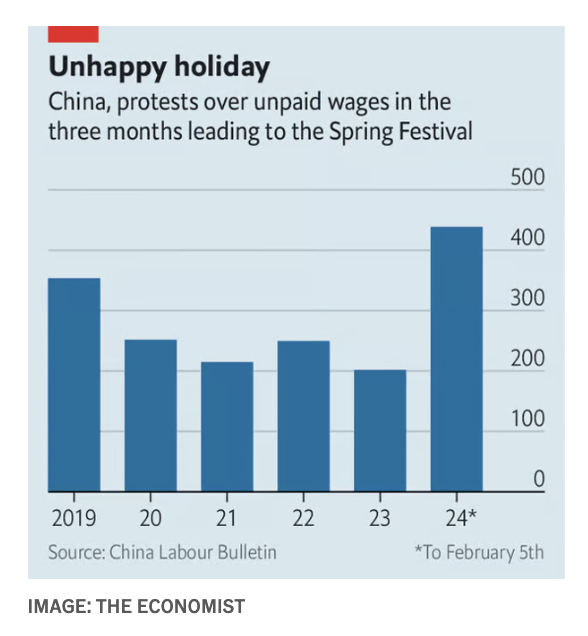
This year, as China’s economy sputters, things are worse than usual. Protests over unpaid wages in the period before the Spring Festival have doubled compared with last year, according to data from China Labour Bulletin, a watchdog organisation in Hong Kong (see chart). Several local governments have voiced concerns. The “severity and complexity of the situation cannot be ignored”, said the Communist Party boss of Huaibei, a city in the eastern province of Anhui, last month.
Our researcher also commented on the campaign to eradicate the problem of unpaid wages:
The central government says it wants to help. In December, officials launched a campaign to “eradicate” the problem of unpaid wages, threatening to punish recalcitrant firms. But previous efforts have had little effect. Although the government can force state-owned companies to cough up, it has little sway over the private contractors that are at the heart of the problem, says Aidan Chau of China Labour Bulletin.
